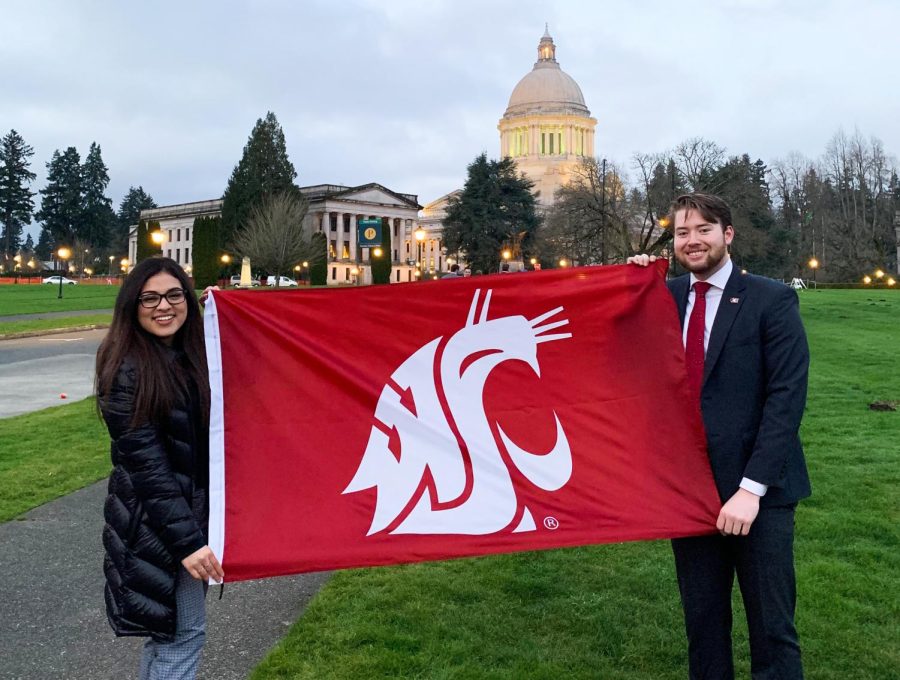WSU representatives reflect on 2022 legislative session
Students, administration, faculty lobby in Olympia
Students from WSU, including members of ASWSU and GPSA, visit the Washington State Capitol.
March 31, 2022
WSU students, faculty and administrators focused on anti-hazing, access to broadband internet, faculty pay and more during the 2022 legislative session, which started Jan. 10 and ended March 10.
WSU students are represented every year by a group of fellow students that choose to go to the Washington State Capitol in Olympia to advocate for certain bills and budget items, said Estela Navarro, senior economics major and ASWSU deputy director of legislative affairs.
Hazing prevention
This year, students, faculty and administrators advocated for Sam’s Law, a bill that focuses on anti-hazing education and prevention.
The bill is named after Sam Martinez, a WSU student who died in 2019 from alcohol poisoning during an event hosted by Alpha Tau Omega fraternity, according to a Daily Evergreen article.
Sam’s Law requires schools to deliver educational programs to new students. WSU plans to implement the training as part of New Coug Orientation, Navarro said.
The bill also requires schools to report any and all incidents so that information can be available to the public, said Chris Mulick, WSU Director of State Relations.
Navarro said the bill requires the creation of a hazing prevention committee to promote and address anti-hazing causes.
The committee will include members of Greek life and students in organizations and clubs from across campus. There is no timeline on when this committee will be established, Navarro said.
Access to broadband internet
During the height of the pandemic when classes were online, students without access to reliable internet were at a disadvantage, Navarro said.
An expansion of broadband internet services statewide would allow more students across the state to take online classes and broaden educational opportunities, she said.
Washington state provided over $1 million to the Port of Whitman County to increase broadband internet access. The project is expected to be complete by Dec. 1, 2023, according to the Washington State Department of Commerce website.
Faculty compensation
The 2021-23 state budget provided for an increase in classified staff compensation, but did not provide for an increase in faculty compensation, Mulick said.
The 2022 session was an opportunity to make real progress in the compensation of faculty. The state passed $7.5 million toward faculty and professional staff compensation, he said.
“Thanks to some rather extraordinary tax revenues driven by our economy, there was an opportunity to do more than usual,” Mulick said.
WSU students also lobbied for faculty compensation, Navarro said.
“WSU can be more competitive when it comes to recruiting really great professors and really great staff members,” she said.
Washington College Grant and student loans
House Bill 1835 widens the eligibility for the Washington College Grant, which provides students in Washington state significant funds toward their college education, Mulick said.
Increasing eligibility for the Washington College Grant will help WSU’s student retention and recruitment, Navarro said.
The Washington College Grant is currently available to students whose family income falls at 55% of the median family income or below. The legislation increases eligibility to families at 60% of the median family income or below, Mulick said.
House Bill 1736 established a state-run student loan program. The legislature devoted $150 million toward the bill with interest rates at 1%, Mulick said.
Other items
WSU will create a cybersecurity program to be offered by the Voiland College of Engineering and Architecture at the Pullman and Tri-Cities campuses, Mulick said.
WSU will also establish a psychiatric pharmacy residency program in Eastern Washington that will house two residents per year, he said.
The university is helping grow the number of nurses who are trained as sexual assault examiners by opening up the second training location in the state and the first in eastern Washington, Mulick said.
Harborview Medical Center in Seattle is currently the only location for such training, Mulick said.
Faculty were represented at the state legislature by Steve Bollens, WSU Vancouver professor of biological sciences. Bollens was a member of the Council of Faculty, which includes one faculty member from each of Washington state’s six public colleges, Bollens said during a presentation to the Faculty Senate.
Mulick said WSU’s policy goals align with Washington state, and that faculty compensation is always a focus.
Cougar Lobby Team
Students who would like to lobby for policies at the next legislative session in January 2023 can join ASWSU’s Cougar Lobby Team, Navarro said.
Prior to the legislative sessions, members of the Cougar Lobby Team speak to students about issues that matter to them. During the legislative session, they get a chance to testify in support of certain legislation during what is known as Coug Day at the Capitol, Navarro said.
“It’s really great to have your voice heard, especially during Cougar lobbying day,” Navarro said. “It was really exciting and empowering to be in those spaces with legislators.”
The last two Cougar lobbying days were held on Zoom, but students typically get the chance to go to Olympia and meet legislators in person, she said.
Students interested in joining the Cougar Lobby Team can attend an event hosted by current team members at 6:30 p.m. on April 13 in Butch’s Den in the Compton Union Building, Navarro said. Ellen Taylor, interim vice president and vice chancellor for Student Affairs, will speak to attendees about student advocacy.










